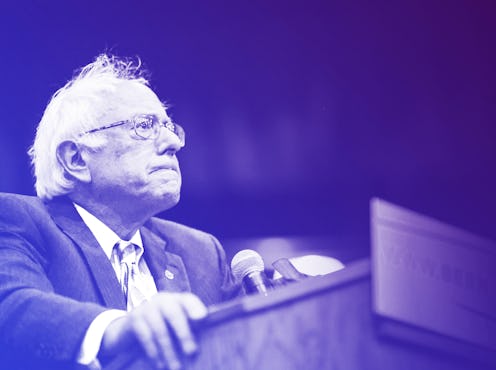News
How To Be The "Establishment" By Bernie Sanders

You either die a hero or live long enough to see yourself become the "establishment" — at least, that's the way it seems based on Bernie Sanders comments as of late. Accusing any non-supporters of being part of the "establishment" has become such a common line for his campaign that even longtime friends and political allies, including California Sen. Barbara Boxer, have sort of had enough. In an interview with Joe Scarborough on MSNBC's Morning Joe on Wednesday, Boxer called foul on Sanders' penchant for over-using the "establishment" label.
Boxer drew attention to the fact that Sanders has a habit of dismissing progressive organizations and politicians that happen to be supporting his opponent, former Secretary of State Hillary Clinton, as parts of the "establishment." Most recently it was used towards California Gov. Jerry Brown, who had recently endorsed Clinton. Of Brown's endorsement, the Vermont senator said to The Sacramento Bee, "It's not surprising to me that, you know, we will have the Democratic establishment supporting Hillary Clinton." Boxer called Sanders out for brushing off of Brown as part of the "establishment," saying:
For Bernie to say that Jerry Brown is establishment is kind of the biggest joke of the day. ... Just because you are supporting Hillary doesn't mean you are, quote, the establishment. It means you are progressive and you want to see her [as president]. She is so qualified for this post. She is just what we need. I love Bernie, he's my friend for a long time. But you can't just diss everybody who supports Hillary Clinton.
Gov. Brown is one in the long list of those Sanders considers "establishment." In January, Sanders implied to MSNBC's Rachel Maddow that Planned Parenthood, Human Rights Campaign, and NARAL Pro-Choice America were also under the "establishment" umbrella — while also saying he would've loved to have had their endorsements. It made me wonder whether the criteria for being a part of the "establishment" — a word with generally negative political connotations that's awful hard to refute if you're not familiar with individual politicians, their platforms, and their work — has anything to do with being a progressive, or if it really boils down to whether you side with Sanders or not.
I believe Sanders has consistently made fair and valid points about the dangers of money and power in politics, but the efficacy of his arguments is eroded by how carelessly he and his campaign throw around the term "establishment." If everyone becomes the establishment — from life-long civil servants to advocacy groups — it becomes significantly harder to determine what the real threats and the real solutions are. Meanwhile, there are arguments that the label itself is sort of arbitrary — and that it could easily include the Vermont senator who had held on to his seats in Congress for decades.
As Phillip Bump wrote for The Washington Post, people like Sanders (and Sen. Ted Cruz — Rest In Pieces) who loudly rage against the machine of the "establishment" are sort of kidding themselves by drawing a line in the sand between their moral high-ground and other politicians:
The "establishment" is not a single ideological mass; it is the building that houses the bumper cars. Just because you're ramming your car against another part of the establishment doesn't mean you're not establishment, too.
Likewise, there are arguments to be made that Sanders — a politician who has held on to his seat for decades is as much of a career-politician, insider as anyone else.
If everyone becomes the "establishment," it becomes significantly harder to envision a future where we're all collaborating with one another to determine what the real threats and the real solutions are to reach the lofty progressive goals. Due to how freely and indiscriminately Sanders tosses around the "establishment" label, it feels more and more like there's no room in the #Revolution for those who disagree on the exact means of reaching a very similar end.
Image: Bustle/Caroline Wurtzel